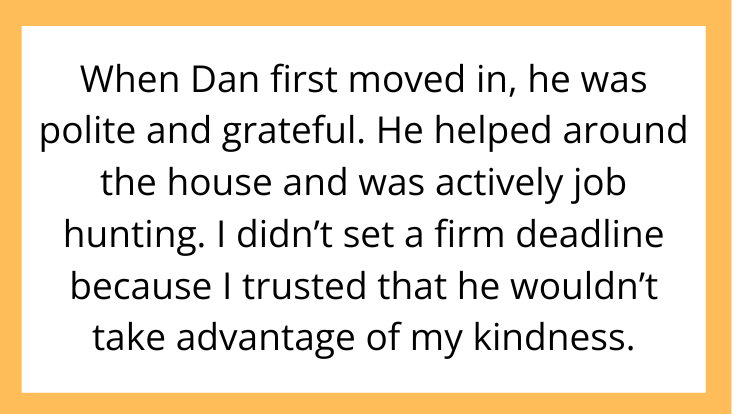AITAH for Kicking My Brother Out After He Brought His Girlfriend to Stay Without Asking?
When you open your home to family, you expect a certain level of respect and communication. But what happens when those boundaries are crossed, and you’re left feeling like a stranger in your own space? Today’s AITAH story dives into the clash between generosity and entitlement—and whether saying enough is enough makes you the villain.
The Situation: A Generous Invitation Gone Wrong

I (31M) have a younger brother, Dan (26M), who was going through a rough patch earlier this year. He lost his job, broke up with his long-term girlfriend, and couldn’t afford rent anymore. Out of compassion, I offered to let him stay with me rent-free until he got back on his feet.
When Dan first moved in, he was polite and grateful. He helped around the house and was actively job hunting. I didn’t set a firm deadline because I trusted that he wouldn’t take advantage of my kindness.
Unfortunately, that trust didn’t last long.
The Unexpected Guest: A Girlfriend Appears

Two months into his stay, I came home from work to find a stranger in my kitchen. Dan had started dating someone new—Lisa—and apparently, she was now spending nearly every night at my place.
I tried to be understanding at first. Everyone deserves companionship, especially during hard times. But over the next few weeks, her presence became constant. She was there in the mornings when I left for work and there when I got home. She cooked in my kitchen, used my shower, and even started leaving her things in my bathroom.
The problem wasn’t just that she was staying over. It was that neither of them had asked me if it was okay.
Drawing the Line: Setting Clear Boundaries

After a month of this, I sat Dan down and told him that I wasn’t comfortable having Lisa stay over so often. I explained that it was one thing to help him during a crisis, but I hadn’t agreed to support two people indefinitely. I asked that he either have her visit less often or at least ask me before she stayed overnight.
Dan said he understood, but nothing changed. In fact, Lisa started coming over even more. One day, I came home early and overheard them talking about how “she might as well move in.”
That was my breaking point.
The Decision: Eviction or Enabling?

I told Dan that he had a week to find somewhere else to stay. He was shocked and accused me of being heartless for kicking him out when he was still unemployed. Lisa chimed in, calling me selfish and saying I was tearing apart their relationship.
I felt guilty but also frustrated. My house had stopped feeling like my own, and every conversation about respecting my space was ignored.
Dan ended up moving in with a friend, but he hasn’t spoken to me since. Our parents think I overreacted and should have just “let it go until he found a job.” Some of my friends, however, said I should have set firmer boundaries sooner.
Respect vs. Enabling: Where’s the Line?

The Case for Kicking Him Out
From my perspective, I was offering a lifeline, not permanent housing for two adults. I never agreed to support Dan’s new relationship. The constant presence of someone I barely knew, without even the courtesy of asking, felt disrespectful.
Many commenters on r/AITAH agreed, pointing out that guests who overstay without permission are crossing a line.
As one user put it, “Your home, your rules. He didn’t even pretend to respect them.”
The Case Against
But others argued that Dan was in a vulnerable position, and kicking him out could have worsened his financial struggles. They felt that family should be more patient, even when inconvenienced.
One commenter wrote, “If the tables were turned, would you want your brother to kick you out? Maybe you could have given a clearer ultimatum first.”
What This Reveals About Boundaries

This story highlights something many people struggle with: the balance between compassion and self-respect. Helping family doesn’t mean surrendering your autonomy. If someone takes advantage of your kindness, it’s okay to draw the line.
It also underscores the importance of communication. If Dan had simply asked before Lisa moved in, and respected my response, this might have ended differently.
How to Handle Situations Like This

If you ever find yourself in a similar scenario, consider these steps:
-
Set clear expectations from day one. Spell out what you are comfortable with and what isn’t acceptable.
-
Communicate concerns early. Don’t wait until frustration boils over.
-
Be consistent. If boundaries are crossed, enforce consequences.
-
Offer alternatives. I tried to help Dan find other housing options, but he refused.
Ultimately, you’re not obligated to sacrifice your comfort indefinitely for someone else’s convenience.
The Verdict: AITAH?

So, was I the villain for kicking my brother out after he brought his girlfriend to stay without asking? I don’t think so—but I understand why some people feel differently.
Boundaries don’t make you cruel. They protect your mental health and preserve your sense of home.



